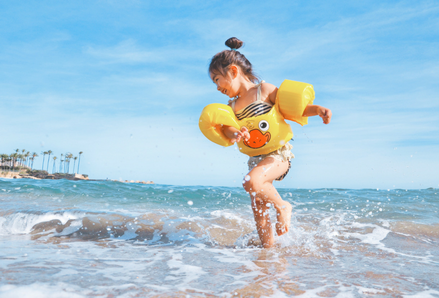March break is right around the corner! We’ve collected a few of our favourite travel tips to help you plan a safe and healthy family trip.
Whether you’re exploring castles in Europe or cruising by coral beaches in the Caribbean, take a few minutes to run through this checklist and make sure your family is ready to travel.
Your March Break checklist: The basics
No matter what your destination, some travel health basics are always important!
- Immunizations: It’s not too late to make sure your immunizations are up to date. Book an appointment with your health provider to ensure that you and your family are good to go.
- Food and water safety: Knowing how to choose safe food and water can help you stay well and avoid unpleasant illnesses like Traveller’s Diarrhea. It’s a good idea to review food and water safety basics with your family before you travel. The golden rule is: Boil it, Cook it, Peel it, or Forget it!
If your child has food allergies, you can prepare them to take an active role in their health away from home. Sometimes kids forget, are too shy, or embarrassed about asking for special requests related to their food allergies (especially if they’re not travelling with you).
Learn more in our kids and food allergies tipsheet.
- Handwashing: Did you know that many travel-related illnesses can be prevented by handwashing? Wash your hands frequently and thoroughly using soap and water (or an alcohol-based hand sanitizer if soap and water aren’t available).
- First aid kit: Pack a first aid kit to deal with scrapes, blisters, allergies, and other common ailments. Dr. Erik McLaughlin offers his advice on how to assemble the perfect travel first aid kit.
- Bed bugs: Staying at a 5-star resort? Bed and breakfast? Homestay? Bed bugs don’t discriminate. Learn how to do a bed bug check and prevent bed bugs from hitching a ride home with you.
Keeping kids safe and healthy
Pediatrician and travel medicine practitioner Dr. Karl Neumann offers a wide range of tips for keeping your youngest travellers healthy. His advice on motion sickness and how to keep kids from getting lost are especially helpful for March Break travel.
- Dealing with motion sickness: Motion sickness can strike on amusement park rides, cruise ships, planes, or in the car – and kids are especially susceptible. Recognize the early symptoms: Your child may curl up or become dizzy, sweaty, or pale. Try to prevent your child from vomiting by distracting them with word games, exposing them to fresh air, avoiding food odours, and having them close their eyes.
- Do your kids know when to hug a tree? Getting lost can be a scary experience for young children. Teach young children to stay put if they lose sight of you. Make sure that older children understand where you will meet them if you do become separated.
Sun holidays and cruises
Going south for March break? Keep these tips in mind while you enjoy your sun vacation.
- Don’t forget sun protection: There’s no such thing as a healthy tan. Sun protection is essential year-round, especially for kids. Avoid sun exposure by staying in the shade if possible. Kids over 6 months of age should use SPF 30 sunscreen and re-apply often if they’re swimming or sweating heavily. (Sunscreen is not recommended for infants younger than 6 months. Keep them in the shade instead.) Wearing hats, sunglasses, and lightweight long-sleeved clothing also reduces your sun exposure.
- Using sunscreen and insect repellent at the same time: Apply sunscreen first and repellent second. Insect repellent can reduce the efficacy of sunscreen, so it’s best to reapply sunscreen often or wear long clothing.
- At the beach, sit on a towel and wear shoes or sandals: Hookworm (also known as Cutaneous Larva Migrans) is an itching skin infection acquired by sitting or walking barefoot on contaminated sand or soil. To avoid it, always wear shoes or sandals, sit on a towel at the beach and wash it after each use, and wash your hands and feet with soap and water after touching sand or soil. Children should wash thoroughly with soap and water after playing in the sand.
- Staying well on a cruise: Cruises are becoming more and more popular. Many cruise ships have a doctor on board, but the close quarters of a cruise ship can affect your health. If you’re planning a cruise, check out our tipsheet on how to be healthy on a cruise.
Photo by Leo Rivas on Unsplash.
Article by Daphne Hendsbee.



